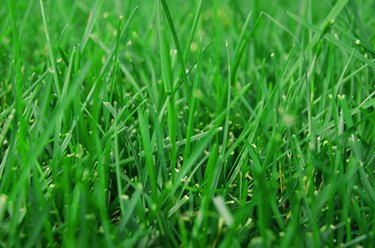
There are many varieties of grass seeds available. Some varieties do better than others under certain conditions. Soil, weather and amount of sun are factors to consider when choosing a grass type. If conditions are particularly dry and there is little rainfall, choose a grass seed that has the ability to grow under these conditions and is drought resistant. There are several types of grass seed that you can choose from.
Zoysia
Video of the Day
Zoysia is a warm season grass that is extremely durable and tolerant. It provides flexibility for homeowners because it requires very little care and can grow in a wide variety of conditions, including very dry conditions. It has an extensive, rigorous root system that rarely needs watering. The deep roots can extract water deep below the surface of the lawn. It is one of the most drought-resistant grasses.
Video of the Day
Bermuda
Bermuda grass is one of the best grasses for dry conditions. It can endure long periods with little or no water. Bermuda grass has a deep root and rhizome penetration so it can tolerate extremely dry soil. There are many types of Bermuda grass, including Sundevil, Yukon, Mohawk and Arizona.
Tall Fescue
Tall fescue is a drought-resistant grass that can thrive in a variety of soils. It is a cool season grass that turns green early in the spring and continues to be green late in the fall. It is ideal for areas with hot, humid summers. For best drought resistance, mow tall fescue to three inches or higher.
Buffalo
Buffalo grass originated in the Great Plains and has been recently adapted for home lawn use. It is popular in areas like Texas and Nebraska that are extremely dry. Buffalo grass actually does better in areas of less rainfall. It thrives in dry, drought-like conditions but cannot compete with weeds that develop in areas with moderate rainfall. Buffalo grass will grow in areas with as little as 15 inches of rain a year. It is able to survive long droughts and will green up with a rainfall.
Bahia
Bahia grass is a warm season and pasture grass. It is more common in the Southern states because of its ability to thrive in dry conditions. Bahia grass requires moderate lawn care but little watering.